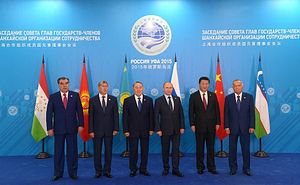Central Asia’s inherited and pockmarked borders are again causing trouble. The flareup in border tensions between Kyrgyzstan and Uzbekistan which started shortly before Nowruz, looks to be the most significant in recent years. The tensions were ostensibly touched off by a sudden increase in Uzbek military forces near a disputed segment of the Kyrgyz-Uzbek border along the northern edge of the Fergana valley. While the incident has not escalated on the ground, the war of words certainly has.
Almazbek Atambayev, the president of Kyrgyzstan, says he might cancel his planned trip this summer to attend the Shanghai Cooperation Organization (SCO) summit in Tashkent, Uzbekistan, if tensions on the border persist. Meanwhile, the Collective Security Treaty Organization (CSTO) in Moscow has been informed of the situation by Bishkek. 24.kg reported that a deputy secretary general has been dispatched to the region to “study the situation.” Atambayev said on March 24 that Kyrgyzstan was obliged to notify the CSTO about the border situation, “Better safe than sorry.”
Uzbekistan has been a member of the SCO since 2001, joining the five founding members: China, Russia, Kazakhstan, Kyrgyzstan and Tajikistan. Tashkent is scheduled to host the SCO’s heads of state summit June 23-24, and incidentally, Bishkek is scheduled to host the annual SCO heads of government meeting sometime this year (likely December, based on past summit dates).
Atambayev has nearly three months before the Tashkent summit, plenty of time for the tensions to either abate or calcify. The Kyrgyz president up to this point has been fairly quiet on the border tension, with the Kyrgyz government responding through the prime minister, border services spokesmen, and the Kyrgyz government’s special envoy on border issues. Atambayev’s reaching out to the CSTO demonstrates a desire to reaffirm Kyrgyzstan’s position vis-a-vis Uzbekistan. Uzbekistan is larger economically and militarily, but Kyrgyzstan has better relations with the neighborhood’s overseer, Russia.
Uzbekistan is not a present member of the CSTO, having suspended its participation in the alliance in 2012. Timur Toktonaliev, of IWPR, spoke to several regional experts to get a sense of why Bishkek reached out to the CSTO and what it can expect (or not) from the group:
Uzbekistan withdrew from the post-Soviet regional security pact [the CSTO] in June 2012, but [Emil] Juraev said that Tashkent remained an important partner for all this body’s member states.
Kyrgyzstan was testing the water to whether CSTO could help it out, he suggested, but the bloc members confined themselves to issuing a statement that they were concerned and would continue to monitor the situation.
The bottom line seems to be that although Kyrgyzstan is a member of the CSTO, and Uzbekistan is not, the bloc’s members don’t necessarily feel inclined to take Kyrgyzstan’s side in a big way. The group hopes the tensions don’t escalate as that may necessitate a stronger response. At least that’s what Bishkek thinks. Atambayev said recently “Many have criticized the CSTO, but it should intervene only in the case of aggression by another state.”
This is not criticism of the CSTO for not acting during either of Kyrgyzstan’s revolutions (in 2005 and 2010). The logic for abstaining from rescuing the deposed presidents was that the organization is obligated to act if a member is attacked from outside, not within.
As detailed in this article from RFE/RL (which also includes a helpful map to give a sense of position), the border problem has been “seized upon by Kyrgyz opposition leaders, who have sharply criticized the country’s government for its weak response to the moves by Uzbekistan.” This dovetailing–of external and internal tensions–is where the real risk resides.

































